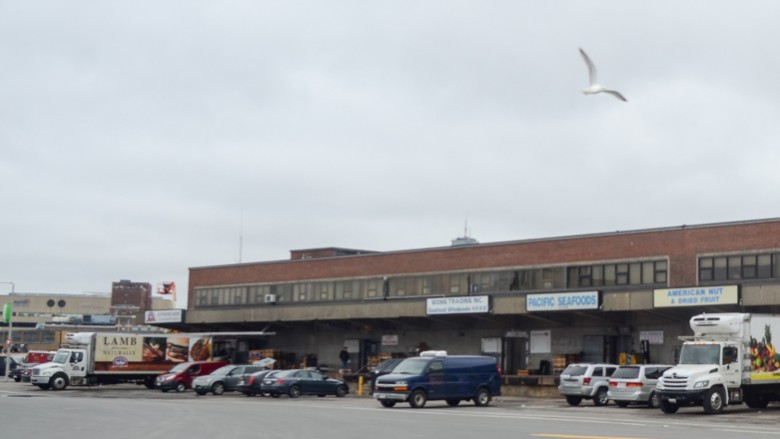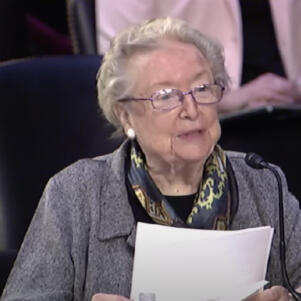Boston’s Newmarket feels development pressures
By Beth Treffeisen | March 22, 2016, 5:00 EDT
 Some of the buildings at Newmarket in Boston’s light industrial district. (New Boston Post photo by Beth Treffeisen)
Some of the buildings at Newmarket in Boston’s light industrial district. (New Boston Post photo by Beth Treffeisen) BOSTON – Seagulls fly through the air as trucks drive in and out of the lots around one-story buildings that form a triangle. In the middle, a dumping site creates an unpleasant accent, with garbage strewn about.
Welcome to Boston’s Newmarket district. Inside these industrial buildings are dozens of food-processing, manufacturing and supply companies, providing a vital source of jobs to local residents and products for Boston and nearby communities.
“It’s critical,” Ed Milan, the owner of Damon Distributing, a ground beef manufacturer, said of his Newmarket location. “This is like a central hub. I see people come and go and once people go, they are basically invisible.”
Newmarket, which is adjacent to the South Bay shopping plaza, is one of a trio of industrial areas clustered on either side of Interstate 93 as it cuts through Dorchester and South Boston. Widett Circle sits on the other side of the highway, opposite the Flower Exchange, which is just north of Newmarket and the Suffolk County jail. All three districts have been the focus of development ideas for years and have been hemmed in by projects seeking to add retail and residential space to the area. Business owners in Newmarket like Milan say they’re very much aware of trends transforming the city.
“It is putting tremendous pressure” on employers, said Sue Sullivan, the executive director of the Newmarket Business Association. “When someone offers more and more money for your property, it makes you think twice.”
Newmarket, which is roughly bordered by Massachusetts Avenue, the South Bay plaza and the highway, will soon come under even more pressure. According to the Boston Redevelopment Authority, five six-story buildings with approximately 113,000 square feet of commercial and retail space, a 12 screen cinema, a 130-room hotel, two parking garages and about 475 units of housing are slated to be added at South Bay.
The plans are adding fuel to already booming real-estate prices in the area. Plenty of Newmarket businesses have been tantalized with offers of large sums for their land, but many say they’re not selling.
Across the highway, sandwiched between the Southeast Expressway and a rail yard, Widett Circle hosts a wholesale food market. During the aborted drive to make Boston the host of the 2024 Olympic Games, part of the plan called for a temporary 60,000-seat stadium on the site. The family of Robert Kraft, who owns the New England Patriots football team and the New England Revolution soccer team, also were reportedly eying the area for a new soccer stadium.
Although the Olympic dreams have faded, Sullivan, who has spent 25 years protecting the area’s industrial use from residential conversion, said development pressures still remain. And there are natural forces at work as well, she said.
“The problem we have is a lot of our companies – that are food companies – unless they pass it down to family members, the owners are getting older,” she said. “Certainly that changes your outlook on your business and your property.”
In Newmarket, some 235 light-industrial companies employ more than 20,000 people that live either near or in the city, and the jobs for non-college graduates generally pay well enough to cover basic living expenses, Sullivan said. A 2013 study by her organization projects employment growth of 13 percent for a broader district centered on Newmarket that includes Widett Circle and the Flower Exchange.
“If you lose these jobs you really are gentrifying the area,” Sullivan said in the interview. The 2012 study says the Boston Redevelopment Authority “envisions Newmarket ‘as a job-center.’”
The city recently gave some added protection to Newmarket , through a rezoning in 2014, the first since the 1960s. The agency’s updated plan identifies 51 specific uses, including food manufacturing, processing and distribution, and provides for new industrial uses. This includes expanding green and clean technology along with beverage manufacturing such as breweries and distilleries.
“New zoning for Newmarket will keep good jobs in the city,” Mayor Marty Walsh said in a news release that accompanied the new zoning. “This neighborhood is at the center of our city’s cutting-edge industrial economy and with this new zoning, we’re confident its evolution will continue.”
Many of the businesses in Newmarket Square moved there in 1953 from the area around Faneuil Hall and Haymarket Square in downtown Boston, after urban renewal projects targeted those areas for development. Newmarket at the time was mostly vacant land. Sullivan said the area was largely neglected by the city at the time, with few services and very little public protection.
But generations of families stuck with their businesses in the district. At Katsiroubas Bros., established in 1914, members of the family still run the business, which distributes everything from “soups to nuts.”
But Steve Galvin at Katsiroubas says the pressures the business has been experiencing recently have more to do with demand from his customers than potential property buyers.
“It’s getting a lot harder now because our customer base is spread out and we need a little more room – it’s tough,” Galvin said, referring to the amount of space his company has at Newmarket.
Another Newmarket company, Pier Fish, has already moved to establish operations outside the city, distributing mostly out of Taunton now. But it still holds onto its Newmarket building for transferring goods to smaller trucks to get into Boston and for some packing. The business is a recent arrival, having been forced to leave a South Boston pier to make way for the Silver Line transit extension to the Seaport District.
Moving can present a problem for workers, too.
At Damon Distributing, Milan said that many of his employees are “lifers” who have stuck with the company and would find it difficult to move. Damon relocated to Newmarket in 1976 from the Faneuil Hall area and has been in his family for four generations. Milan said his son, Scott, hopes to stay with the business as well.
“Hopefully we’ll be here a long, long time,” Milan said.
NBPUrban












